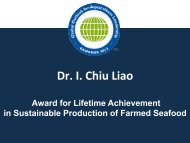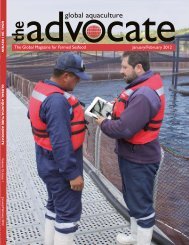May/June 2010 - Global Aquaculture Alliance
May/June 2010 - Global Aquaculture Alliance
May/June 2010 - Global Aquaculture Alliance
Create successful ePaper yourself
Turn your PDF publications into a flip-book with our unique Google optimized e-Paper software.
Although Bowen had many business interests, his “crowning achievement” in aquaculture<br />
was Belize <strong>Aquaculture</strong> Ltd.<br />
Sir Barry Bowen: The Belizean<br />
Who Changed Shrimp Farming<br />
Robins McIntosh<br />
Senior Vice President<br />
Charoen Pokphand Foods Public Co.<br />
C.P. Tower 27 Floor<br />
313 Silom Road, Bangrak<br />
Bangkok, 10500, Thailand<br />
robmc101@yahoo.com<br />
Not everyone has an opportunity to work<br />
with a legend. As a past employee of Sir<br />
Barry Bowen, I did.<br />
On February 26, my old employer<br />
and still friend Sir Barry Bowen died in a<br />
plane he was piloting. Upon receiving<br />
this news in Bangkok, my mind raced as<br />
to what this man had meant to me personally<br />
and then to what he had meant to<br />
Belize and to the world community of<br />
shrimp farmers.<br />
Barry had so many times in the past<br />
picked me up from the shrimp farm in his<br />
modified Cessna 208 to take me to<br />
Ambergris Caye for a weekend. A weekend<br />
where he would discuss his dreams<br />
and, more importantly, how to make those<br />
dreams reality.<br />
Barry Bowen had been flying planes<br />
like most of us drive a car for 43 years.<br />
He made that flight daily to his home in<br />
Ambergris Caye. He was meticulous<br />
about the plane’s maintenance, and every<br />
time I entered the cockpit with him, he<br />
would spend time going over his check<br />
list before takeoff. He would arrive home<br />
in the late afternoon, but always before<br />
sunset. Barry was a risk taker, but he was<br />
careful and always meticulous in everything<br />
he did.<br />
Belize First<br />
Generally when one writes about<br />
Barry Bowen, you begin by describing<br />
him as one of the wealthiest individuals<br />
in Belize – and that he was. But that simple<br />
description does not give this man his<br />
true merit.<br />
He was first a Belizean, a man who<br />
lived for his beloved Belize. He was a very<br />
proud seventh-generation Belizean, and<br />
always let me know that any investing he<br />
did would always be in Belize.<br />
Barry did not believe in paper assets.<br />
He invested in hard assets, projects that<br />
would be good for the Belizean economy.<br />
And as he told me more than once: “I am<br />
not a passive investor. I take an active<br />
part in any investment I make.”<br />
That is the Barry Bowen I remember<br />
– the man who was ankle deep in a<br />
muddy sump installing a seawater pump.<br />
A man stooped over the hood of a truck<br />
as the final layout of ponds was decided.<br />
A man in the farm warehouse taking<br />
apart a paddlewheel aerator so he could<br />
Barry Bowen was knighted<br />
by Queen Elizabeth<br />
in 2008 for his many<br />
contributions to Belize.<br />
find ways to improve the gearing mechanism.<br />
From Beer To Belize<br />
<strong>Aquaculture</strong><br />
In the beginning, I must admit I was a<br />
bit mystified by Barry, a dreamer and<br />
visionary of the first order. Barry did<br />
dream, but it was a calculated dreaming he<br />
knew how to make a reality.<br />
There was never a better person at<br />
putting together a project from scratch<br />
than Barry Bowen, especially projects<br />
that others said just could not be done.<br />
He enjoyed sitting me down and telling<br />
me the story of Belikin Beer, for example.<br />
After obtaining an engineering degree<br />
from Cornell University, Barry returned<br />
to Belize to work with his father in the<br />
family-owned Coca-Cola bottling business.<br />
For a dreamer and young man with<br />
entrepreneurship in his veins, this would<br />
not last long. He dreamed of a beer brewery<br />
in Belize.<br />
He asked his father to invest but was<br />
quickly told, “Barry, Belize does not have<br />
the population to support a brewery.” So<br />
Barry took his life savings, a couple of<br />
thousand dollars, to Miami and looked<br />
up a retired German brewmaster living<br />
there. Could the man develop a business<br />
plan for a brewery in Belize?<br />
Belize <strong>Aquaculture</strong> was a pioneer in the use of pond liners and regular aeration. The<br />
shrimp farm’s sloped embankments were covered with fabric mesh sprigged with grass<br />
to control erosion.<br />
The brewmaster repeated Barry’s<br />
father’s advice, but Barry insisted that<br />
even though Belize had a small population<br />
and one with the lowest beer consumption<br />
in Central America, he could<br />
make it work. He also told the brewmaster<br />
he would give him his savings to help.<br />
And so Barry Bowen got a business plan<br />
for developing a brewery in Belize.<br />
Then he figured he needed to learn<br />
the business, and so off for the summer<br />
went Barry to see a family friend who<br />
owned Cerveceria Hondurena in Honduras.<br />
He left for Honduras and volunteered<br />
his work in the brewery to learn<br />
more about beer.<br />
After a couple of months, Barry scheduled<br />
an appointment with the owner and<br />
asked him if he would like to invest in a<br />
brewery in Belize. As Barry would tell it,<br />
the owner just about laughed him out of<br />
the office. “I bet you don’t even have a<br />
business plan,” the owner said. Barry<br />
smiled and presented him with his business<br />
plan. A bit shocked, the owner told<br />
Barry to come back in a week after he<br />
studied the document.<br />
Upon his return, the owner told<br />
Barry, “I will financially back your plan,<br />
provided you promise that you will personally<br />
work in this brewery business for<br />
five years.” And with that, Barry Bowen<br />
had found a backer and the technical support<br />
for his first brewery.<br />
It is said that Barry personally helped<br />
lay the bricks for the foundation of the<br />
Belikin Brewery, and as Barry was all too<br />
proud to tell, “I turned a profit in my second<br />
year, two years ahead of the plan.” In<br />
not too long a period, Belize went from<br />
last place in Central American beer consumption<br />
to first place. And, of course,<br />
that was not the end of the story.<br />
With profits from the brewery, Barry<br />
bought out his father’s shares in the<br />
Coca-Cola bottling company, establishing<br />
the cash flow that would fund his<br />
future dreams. These included buying<br />
Belize Estates, a company that held title<br />
to over 400,000 ha of land or 20% of<br />
Belize; the world-class jungle ecotourism<br />
resort Chan Chich Resort on his Gallon<br />
Jug Estate Lands; a livestock farm that<br />
produced hybrid cattle with the best-tasting,<br />
most tender beef in all of Central<br />
America; a 1,200-ha organic coffee plantation;<br />
the private Island Academy school<br />
on Ambergris Caye; and what I consider<br />
his crowning achievement, Belize <strong>Aquaculture</strong><br />
Ltd. (BAL).<br />
Barry Bowen thought shrimp aquaculture<br />
was good for Belize. He worried<br />
about the citrus and banana industries<br />
remaining competitive as the world<br />
moved to a global economy. Shrimp, on<br />
the other hand, was a high-value commodity<br />
that Belize could cultivate competitively.<br />
He envisioned being close to the<br />
North American markets, providing<br />
shrimp that were grown in “environmentally<br />
friendly systems.” His greatest dream<br />
was the delivery of newly harvested<br />
shrimp by air directly from the farm to<br />
Bowen’s Belize farm consistently produced<br />
greater volumes of larger shrimp than were typical<br />
of the time.<br />
the major markets of the United States.<br />
Breaking Rules<br />
I first met Barry Bowen through Russ<br />
Allen. I was not sold on working in<br />
Belize. Before I went to meet Barry, an<br />
owner of a major farm in Ecuador had<br />
advised: “Don’t do it. Shrimp cannot be<br />
cultured profitably in Belize. There are<br />
no wild brooders or postlarvae there.”<br />
With that in the back of my mind, I sat<br />
down to talk with Barry Bowen, and we<br />
had the conversation he loves to tell and<br />
retell. This is my version of the story.<br />
It was <strong>May</strong> 1996, and we were on a<br />
porch outside his home on Ambergris<br />
Caye, drinking, of course, Belikin Beer.<br />
He told me he had studied the shrimp<br />
business and was about to invest in it<br />
back in 1992, when disease hit farms in<br />
Central America. He decided there was<br />
too much risk in the way shrimp were<br />
being cultivated in large ponds using lots<br />
of water exchange and wild shrimp. So he<br />
studied some more.<br />
After a visit to the Waddell Center in<br />
South Carolina, USA, Barry decided that<br />
the future was in smaller ponds using little<br />
if any water exchange, closed systems<br />
that would not pollute the waters outside<br />
the farm and using domesticated shrimp<br />
lines that were known to be free of any<br />
diseases. Then he told me the goal of his<br />
farm would be 11 mt/ha/crop with three<br />
crops yearly.<br />
I am sure I looked pretty stunned,<br />
having come from Guatemala, where the<br />
best I had ever accomplished was 7.7 mt/<br />
ha in a couple of ponds. But in the end, I<br />
was on board, and we were going to give<br />
it the best try that technology would<br />
allow – even if it meant breaking all the<br />
rules of shrimp culture that were accepted<br />
in 1996.<br />
Barry made it clear he would invest<br />
U.S. $10 million without losing any<br />
6 <strong>May</strong>/<strong>June</strong> <strong>2010</strong> global aquaculture advocate global aquaculture advocate <strong>May</strong>/<strong>June</strong> <strong>2010</strong> 7





